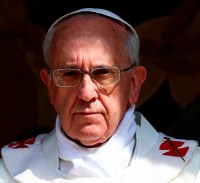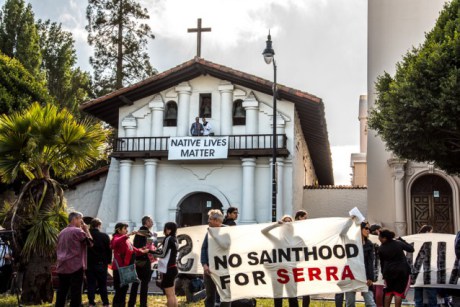‘It is imperative [Pope Francis] is enlightened to understand that Father Serra was responsible for the deception, exploitation, oppression, enslavement and genocide of thousands of Indigenous Californians, ultimately resulting in the largest ethnic cleansing in North America,’ a MoveOn.org petition read.” – Jack Jenkins
 Pope Francis has been widely lauded as a champion of the oppressed, advocating for the victims of war and passionately declaring that “to discriminate in the name of God is inhuman.”
Pope Francis has been widely lauded as a champion of the oppressed, advocating for the victims of war and passionately declaring that “to discriminate in the name of God is inhuman.”
But in September, the pontiff is planning to canonize, or declare a saint, a man who some Native Americans say not only discriminated in God’s name, but also subjugated thousands of Indians along the West Coast using missionary tactics that effectively enslaved his Christian converts.
 On [May 6th], the Vatican formally sanctioned plans to proclaim the saintliness of Junípero Serra, an 18th century Franciscan missionary who converted thousands of Native Americans to Christianity in California before his death in 1784. The Spanish priest is renowned by many Catholics for his devoutness, and Francis is scheduled to make his sainthood official in an elaborate outdoor mass during his papal visit to the United States this fall. The pontiff has expressed deep admiration for Serra, showering him with praise in a recent address to seminarians for exhibiting “generosity and courage” while “usher[ing] in a new springtime of evangelization in those immense territories, extending from Florida to California.”
On [May 6th], the Vatican formally sanctioned plans to proclaim the saintliness of Junípero Serra, an 18th century Franciscan missionary who converted thousands of Native Americans to Christianity in California before his death in 1784. The Spanish priest is renowned by many Catholics for his devoutness, and Francis is scheduled to make his sainthood official in an elaborate outdoor mass during his papal visit to the United States this fall. The pontiff has expressed deep admiration for Serra, showering him with praise in a recent address to seminarians for exhibiting “generosity and courage” while “usher[ing] in a new springtime of evangelization in those immense territories, extending from Florida to California.”
“Such zeal excites us,” Francis said.
But many argue the impact of Serra’s “zeal” is more complicated than the pope suggests. Native American activist organizations such as Mexica Movement have staged several protests outside Catholic sites across California since January, when Francis first announced his intention to canonize Serra. On Monday, demonstrators gathered outside of Mission Dolores in San Francisco, making speeches condemning Serra and unfurling banners emblazoned with slogans such as “No Sainthood for Serra” and “Native Lives Matter.”
“My ancestors were directly enslaved at Mission Dolores here, and at Mission San Jose in Fremont, and I want to make sure that the Vatican knows that we, and Native people allies, do not agree with the canonization of Junipero Serra,” said Corrina Gould, a woman who claims Karkin and Chochenyo Ohlone ancestry, according to Indybay.org.
Organizers have also launched Facebook groups and online petitions urging Francis to reconsider.
“It is imperative [Pope Francis] is enlightened to understand that Father Serra was responsible for the deception, exploitation, oppression, enslavement and genocide of thousands of Indigenous Californians, ultimately resulting in the largest ethnic cleansing in North America,” a MoveOn.org petition read.
 A saint who beat Native Americans?
A saint who beat Native Americans?
Credited with baptizing around 90,000 Indians during his lifetime, there is wide agreement among historians that Serra’s evangelism tactics were harsh by any modern standard. George Tinker, Professor of American Indian Cultures and Religious Traditions at Iliff School of Theology and author of Missionary Conquest: The Gospel and Native American Genocide, described to ThinkProgress what he called the “almost slave-labor conditions” that Native Americans were subjected to under Serra’s leadership. Citing accounts from Serra’s own lieutenant, Tinker said the Franciscan priest prohibited converts from leaving his Christian compounds, often called missions, and forced them to endure grueling labor on Spanish-run farms. Any attempt to flee was met with brutal reprisals.
 “The army would round the person up, bring him back to the mission compound, and then the person is punished,” he said, “The mission compound was run kind of like a military boot camp.”
“The army would round the person up, bring him back to the mission compound, and then the person is punished,” he said, “The mission compound was run kind of like a military boot camp.”
The mission compound was run kind of like a military boot camp.
Tinker, himself a Native American of the Osage Nation who practices traditional spirituality, said Indians were often unwillingly compelled to convert, and that Serra housed women and unmarried girls in tight quarters until he chose spouses for them.
“Indian people had little free choice,” he said. “Conversion [was] almost a last desperation in order to stay alive.”
Native Americans and even some Catholics have opposed the Church’s celebration of Serra for several decades. In the lead up to his beatification — a preliminary step on the road to sainthood — in 1988, advocates in California penned op-eds demanding Church officials acknowledge Serra’s role in harming indigenous populations. In response, the Diocese of Monterey issued a 90-page report rejecting the accusation that Serra mistreated Indians, with one contributor saying “there’s no evidence that Serra ever instituted physical punishment or any kind of unusual punishment.” But several Indians pointed out that the document, which was compiled by a public relations specialist, did not interview any Native Americans, and that Franciscan historians had already acknowledged that Serra “upheld the custom of whipping.”
ThinkProgress contacted the U.S. Conference of Catholic Bishops for a response to the recent wave of anti-Serra protests, but did not receive a reply by press time.
 An agent of colonialism
An agent of colonialism
Some Catholics and scholars have sought to re-examine Serra — who was a member of the Inquisition — as a product of his time, when missionaries all over the globe were encouraged to treat their converts like misguided offspring. Robert M. Senkewicz, history professor at Santa Clara University and co-author of Junípero Serra: California, Indians, and the Transformation of a Missionary, told ThinkProgress that Serra was actually arguably more benevolent than other missionaries, and tried to protect Native Americans from additional exploitation at the hands of the Spanish military.
“In California, [political leaders] always wanted the Indian labor force available to themselves, a sort of series of personal servants,” he said. “Most of the fights Serra had in California were over trying to restrict the military settlers’ access to Native labor.”
Catholics who support Serra’s canonization, such as controversial San Francisco Archbishop Salvatore Cordileone, say his relative altruism toward Indians justifies his sainthood, and that Native life under missionaries was preferable to battling European armies.
“European powers were going to discover this continent and settle here,” Cordileone told the New York Times in January. “Were the indigenous people better off with the missionaries or without the missionaries? I would say they were better off with the missionaries.”
Pope Francis expressed a similar sentiment in his homily over the weekend, claiming that Serra defended “indigenous people against abuses by the colonizers.”
 But Tinker and other Native Americans say Serra couldn’t have protected Indians from colonialism, because he and other missionaries were colonial agents of deeply Catholic Spain. Tinker noted that Serra’s first task after making landfall in San Diego in the 1700s was to celebrate mass on the beach with Native American observers, all while ships offshore fired canons overhead. Tinker also said Serra had at least partial control over the military that accompanied him, and regularly used soldiers to keep Native American converts in line — presumably with whips, which historical records imply he ordered for use on his flock.
But Tinker and other Native Americans say Serra couldn’t have protected Indians from colonialism, because he and other missionaries were colonial agents of deeply Catholic Spain. Tinker noted that Serra’s first task after making landfall in San Diego in the 1700s was to celebrate mass on the beach with Native American observers, all while ships offshore fired canons overhead. Tinker also said Serra had at least partial control over the military that accompanied him, and regularly used soldiers to keep Native American converts in line — presumably with whips, which historical records imply he ordered for use on his flock.
Indian people [of the time] would agree that they were better off dead than living under a Franciscan rule.
“Indian people [of the time] would agree that they were better off dead than living under a Franciscan rule,” he said. “How is that better than what the Puritans did? It’s the same results. Invariably, mission work was a component of colonization, either explicitly or implicitly, and in the case of Serra it was inordinately explicit.”
“This [was] an act of pure colonialism, of nailing down territory.”
Senkewicz also acknowledged that Serra, despite representing the “softer side of colonialism,” was undeniably a willing participant in Spanish conquest and the mistreatment it entailed.
“Violence and coercion were an integral part of the colonial system,” Senkewicz said, referring to the use of flogging in Serra’s missions. “This was justified by a frank paternalism, [the idea] that these people are children, and this is what you do with children.”
 Pope Francis’ saint
Pope Francis’ saint
Pope Francis has been unusually involved in Serra’s soon-to-be sainthood. Normally, a person is vetted for canonization after being approved by the Congregation for the Causes of Saints, a Vatican group which traditionally requires that at least two miracles be attributed to someone before they can be recommended for sainthood. But the congregation actually never approved a second miracle credited to Serra, issuing their endorsement seemingly because Pope Francis had already scheduled the canonization for September. This makes Serra part of a growing list of people deemed saints primarily through the will of Pope Francis, twice without the number of miracles historically needed to do so — including the recent canonization of Pope John XXIII.
Whatever the reasoning for Serra’s sainthood, however, the controversy largely centers around one question: should the pope elevate a man who played a key role in a colonial campaign that harmed Native Americans?
“It legitimizes the conquest,” Tinker said. He predicted the looming canonization will only worsen a longstanding chasm of mistrust between the Catholic Church and Native Americans in California — a rift that largely began under Serra’s ministry.
“Part of me wants to say, ‘Oh yeah, we would like the church to come to its senses,’” he said, audibly sighing. “But as far as I can tell that’s a lost cause.” – ThinkProgress, 7 May 2015
» Jack Jenkins is the Senior Religion Reporter for ThinkProgress.
source


































